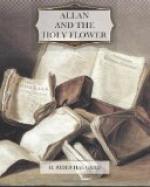“What for?” I asked.
“To propose peace between their people and the Mazitu. Yes, they ask that Bausi should send envoys to their town to arrange a lasting peace. As if anyone would go!” he added.
“Perhaps some might dare to,” I answered, for an idea occurred to me, “but let us go to see Bausi.”
Half an hour later we were seated in the king’s enclosure, that is, Stephen and I were, for Brother John was already in the royal hut, talking to Bausi. As we went a few words had passed between us.
“Has it occurred to you, John,” I asked, “that if you really wish to visit Pongo-land here is perhaps what you would call a providential opportunity. Certainly none of these Mazitu will go, since they fear lest they should find a permanent peace—inside of the Pongo. Well, you are a blood-brother to Bausi and can offer to play the part of Envoy Extraordinary, with us as the members of your staff.”
“I have already thought of it, Allan,” he replied, stroking his long beard.
We sat down among a few of the leading councillors, and presently Bausi came out of his hut accompanied by Brother John, and having greeted us, ordered the Pongo envoys to be admitted. They were led in at once, tall, light-coloured men with regular and Semitic features, who were clothed in white linen like Arabs, and wore circles of gold or copper upon their necks and wrists.
In short, they were imposing persons, quite different from ordinary Central African natives, though there was something about their appearance which chilled and repelled me. I should add that their spears had been left outside, and that they saluted the king by folding their arms upon their breasts and bowing in a dignified fashion.
“Who are you?” asked Bausi, “and what do you want?”
“I am Komba,” answered their spokesman, quite a young man with flashing eyes, “the Accepted-of-the-Gods, who, in a day to come that perhaps is near, will be the Kalubi of the Pongo people, and these are my servants. I have come here bearing gifts of friendship which are without, by the desire of the holy Motombo, the High Priest of the gods——”
“I thought that the Kalubi was the priest of your gods,” interrupted Bausi.
“Not so. The Kalubi is the King of the Pongo as you are the King of the Mazitu. The Motombo, who is seldom seen, is King of the spirits and the Mouth of the gods.”
Bausi nodded in the African fashion, that is by raising the chin, not depressing it, and Komba went on:
“I have placed myself in your power, trusting to your honour. You can kill me if you wish, though that will avail nothing, since there are others waiting to become Kalubi in my place.”
“Am I a Pongo that I should wish to kill messengers and eat them?” asked Bausi, with sarcasm, a speech at which I noticed the Pongo envoys winced a little.
“King, you are mistaken. The Pongo only eat those whom the White God has chosen. It is a religious rite. Why should they who have cattle in plenty desire to devour men?”




